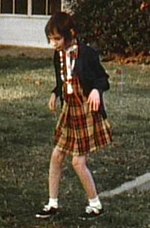Genie (feral child)
From Wikipedia, the free encyclopedia
| Genie | |
|---|---|
 Genie displaying her characteristic "bunny walk" shortly after she was rescued at the age of 13. | |
| Born | April 18, 1957 Arcadia, California |
| Nationality | United States |
| Known for | Feral child |
Genie is the pseudonym for a feral child who spent nearly all of the first thirteen years of her life locked inside a bedroom strapped to a potty chair. She was a victim of one of the most severe cases of social isolation in American history. Genie was discovered by Los Angeles authorities on November 4, 1970.
Psychologists, linguists and other scientists exhibited great interest in the case due to its perceived ability to reveal insights into the development of language and linguistic critical periods. Initially cared for in the Children's Hospital Los Angeles, Genie later became the subject of acrimonious debate over where and with whom she should eventually live, moving between the houses of the researchers who studied her, to foster homes, to her mother's house, and finally to a sheltered home for adults with disabilities in California. Funding and research interest in her abilities eventually ceased and she quickly regressed to her previous state. In 1994 a book was written about her case by Russ Rymer.
As of 2008 she was a ward of the state and in confinement in a private institution for the mentally undeveloped — the location of the institution and her current name are unknown.[1]
Genie's discovery was compared extensively with that of Victor of Aveyron, about whom a film was made, The Wild Child.
Contents[hide] |
[edit]Early history
[edit]Parents and child abuse
Genie's parents lived in Arcadia, California. Genie was their fourth (and second surviving) child and had an older brother who also lived in the home.[2]
Genie spent the first 12 years of her life locked in her bedroom. During the day, she was tied to a child's toilet in diapers; some nights, when she hadn't been completely forgotten, she was bound in a sleeping bag and placed in an enclosed crib with a cover made of metal screening. Indications are that Genie's father beat her with a large stick if she vocalized, and he barked and growled at her like a dog in order to keep her quiet. He also rarely allowed his wife and son to leave the house or even to speak, and he expressly forbade them to speak to Genie. By the age of 13, Genie was almost entirely mute, commanding a vocabulary of about 20 words and a few short phrases (nearly all negative, such as "stop it" and "no more").[3]
[edit]Rescue
Genie was discovered at the age of 13 when her mother left her husband and took Genie with her. On November 4, 1970, the two entered a welfare office in Temple City, California, to seek benefits for the blind. A social worker met them and guessed that Genie was 6 or 7 years old and possibly autistic. When it was revealed that she was actually 13, the social worker immediately called her supervisor, who then notified the Los Angeles County Sheriff's Department.[4] Shortly after Genie was found, her father committed suicide by gunshot.
Genie had developed a characteristic "bunny walk", in which she held her hands up in front, like paws. Although she was almost entirely silent, she constantly sniffed, spat, and clawed. Many of the items she coveted were objects with which she could play.[5] In spite of her condition, hospital staff hoped they could nurture her to normality. When interest in the case widened, Genie became the focus of an investigation to provide evidence supporting the theory that humans have a critical age threshold for language acquisition.[3] Within a few months of therapy, she had advanced to one-word answers and had learned to dress herself. Her doctors predicted complete success. Doctors screened François Truffaut's movie The Wild Child for ideas. Genie was initially moved out of the hospital to the home of Jean Butler, and later was moved to live with psychologist David Rigler, his wife and children, where she remained for four years.[3]
[edit]Characteristics and personality
Though initially nearly silent, Genie later learned to vocalize and express herself through signs. While under captivity she was provided with few toys or objects to stimulate her; the majority of her time was spent in a dark room staring at a yellow plastic raincoat. After her rescue, attempts were made to help her speak and socialize. Her demeanor changed considerably, and she became sociable with adults she was familiar with. Colorful plastic objects became her favorite objects to collect and play with, and she demonstrated a deep fascination with classical music played on the piano (one of the neighboring children practiced piano regularly, and this was speculated to be the source of her fascination as it was one of very few sensations available to her). Genie developed remarkable nonverbal communication skills; repeatedly she and her caregivers were approached by strangers who would, without being asked, spontaneously give Genie gifts or possessions in which she exhibited an interest.[3]
[edit]First foster home
Jean Butler was Genie's teacher at Children's Hospital. Butler became Genie's foster parent by accident or by, as members of the Genie team suspected, a scheme that Butler concocted to allow Genie to stay with her. Butler claimed that she herself had a rash that was likely measles, and thus when Genie had visited her home, Genie may have contracted it. Genie was moved to Butler's home with the initial intent of a temporary quarantine, but the stay became prolonged when Butler petitioned to make it permanent. Butler became very protective of Genie and resisted visits by other members of the Genie team including Susan Curtiss and James Kent.[4]
Butler's personal journal recorded concern that Genie was taxed too greatly by the Genie team and experiments; however, Butler didn't hide the fact that she hoped Genie would help make her famous.[4] According to Curtiss, Butler frequently stated that she was "going to be the next Anne Sullivan." Her true intentions may never be known because she died in 1988, but many members of the Genie team claimed genuine affection for Genie and an overwhelming desire to rescue her.[citation needed]
Butler did, however, continue the essential practice of observing and documenting Genie's behavior while in her home. One such behavior Butler documented was Genie's practice of hoarding, a behavior typical of children who have been moved from abusive homes. When Butler applied to be Genie's legal foster parent, she was rejected.[4]
[edit]Second foster home
Genie returned to the hospital and was handed over to a new foster parent, therapist David Rigler. His wife, Marilyn, became Genie's new teacher. Marilyn found the need to teach Genie unconventional lessons, for example, in anger management. Genie would go into a fit of rage and act out against herself, so Marilyn taught Genie to direct her frustrations outward by jumping, slamming doors, stomping her feet and generally "having a fit." Marilyn noted that Genie had a stronger command of vocabulary than most children acquiring language. During this period Genie was even able to discuss her life before language was a part of it.[4]
- Marilyn Rigler: Where did you stay when you lived at home? Where did you live? Where did you sleep?
- Genie: Potty chair.
- Marilyn Rigler: You slept in the potty chair?
- Genie: Mmm-hmm. Potty chair.[4]
She stayed with the Rigler family for the next four years. During that period she began to learn some language, and the Riglers arranged for her to learn sign language. She also learned to smile. If she could not express herself in language, she would try to communicate by drawing pictures.[3][4]
[edit]Loss of funds and interest
Despite Genie's relative success, the National Institute of Mental Health, which had funded the project, grew concerned about the lack of scientific research data generated, as well as the unprofessional manner in which records were being kept. In 1974, the Institute cut off funding for the research. The following year the Riglers decided to discontinue their foster parenting. Genie had not yet learned full grammatical English and only went so far as phrases like "Applesauce buy store."[4] However, Jones (1995) contends that her linguistic skills have been underestimated.
[edit]Later childhood
In 1975, Genie was returned to the custody of her mother, who wished to care for her daughter. After a few months, the mother found that taking care of Genie was too difficult, and Genie was transferred to a succession of six more foster homes. In some of the homes she was physically abused and harassed, and her development regressed severely. She returned to hercoping mechanism of silence and gained a new fear of opening her mouth. This new fear developed after she was severely punished for vomiting in one of her foster homes; she didn't want to open her mouth, even to speak, for fear of vomiting and facing punishment again.[4]
The original research team heard nothing more about Genie until her mother sued them for excessive and outrageous testing and claimed the researchers gave testing priority over Genie's welfare, pushing her beyond the limits of her endurance. According to ABC News, the suit was settled in 1984.[6] However, in a 1993 letter to the New York Times, Dr. Rigler wrote, "The case never came to trial. It was dismissed by the Superior Court of the State of California 'with prejudice,' meaning that because it was without substance it can never again be refiled."
[edit]
Ps: Reading about Genie Wiley's life sunk my heart. :( I am counting my blessing now. Thank you mommy daddy.
I have highlighted certain phrases that I am contemplating over now.
As I mentioned in my title, these are questions that I am currently running through my head: What does it mean to be human? What is normalcy? Nature vs nurture?
I got into this while attempting to help my brother's friend in his debate - taking the side of Consumerism is a Nurtured behavior.
I don't know if anyone would be on the same wavelength, but this makes me think of social engineering.
Funny how much social engineering went into me ;) engineering/dictating what I think is acceptable or not (liberty! freedom! etiquette! customs! political correctness!) I wonder for what and by who ;) (Probably by those of economic and political power. Haha we, the ones, on the bottom of the predator-prey chain *shakes head* I'm becoming a conspiracy theorist, hahaha :D I know its fun to theorize conspiracies).
What's important here is that, does these social engineering make people happier, wiser, more compassionate? Truth is, we have all been socially engineered (through law, policies, governance, advertisements, social environments etc).
Therefore, rather than dwelling in theory (about the man behind the curtain who control historical events, who run the world, Illuminati, New World Order, pharmaceutical, IMF, etc), let us all only dwell upon thoughts that are relevant and beneficial to society. Naturally, I thought of education. How can I propose a way to educate/socially engineer people to become better human beings?
Now, I am going to research about human nature from a buddhist perspective: 1) to validate buddha's teaching if it conforms to my reasoning, 2) his teachings normally provides a practical, pragmatic solution to many problems.
Off I go.













No comments:
Post a Comment